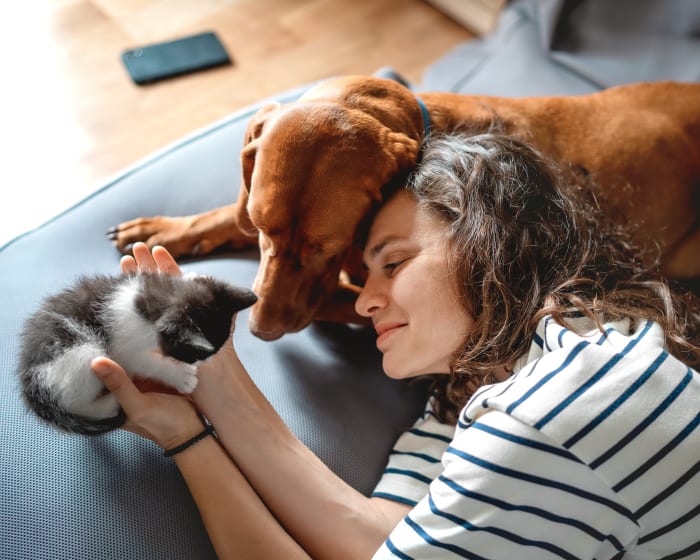Getting Your Pet Fixed
At Downtown Veterinary Clinic, our team recognizes that the choice to spay or neuter your pet can be overwhelming for many pet parents.
Although all surgeries performed under general anesthesia carry certain risks, these common reproductive procedures are generally regarded as safe for most dogs and cats.
Our veterinarians perform these procedures regularly and believe that they help pets live healthier, more content lives while also helping to reduce the number of dogs and cats in animal shelters.

When to Spay or Neuter Your Pet
No one knows your pet's health like a veterinarian. Be sure to consult with your vet for advice specific to your pet.
Cats
These procedures are most commonly performed when kittens are between five and six months old. That said, a healthy adult cat can be fixed at any age.
Dogs
Puppies are usually spayed or neutered at around six months old. However, some vets have determined that it is better to wait until the dog reaches sexual maturity before performing these reproductive surgeries. Speak to your veterinarian to determine the best time to have your dog fixed.
Spaying & Neutering FAQs
For answers to more of your questions about spaying and neutering procedures, please read through the answers to these frequently asked questions from our clients.
-
What is the difference between spaying and neutering?
Neutering (Males)
Neutering, also known as orchiectomy, is a surgical procedure that involves the removal of the testicles from male pets, preventing them from fathering litters of kittens or puppies.
Cats: Neutering your cat can help to curb undesirable behaviours such as spraying, roaming and aggression towards other cats.
Dogs: Neutering your dog may help reduce animal aggression, 'humping,' and attempts to escape your home or yard.
Spaying (Females)
Spaying, technically known as an ovariohysterectomy, removes a female pet's reproductive organs, preventing your pet from becoming pregnant.
Cats: Having your cat spayed can reduce the risk of pyometra (womb infection), can help prevent mammary tumours if done early, and reduce the likelihood of her escaping the house, wandering, yowling, and urinating inappropriately.
Dogs: Having your female dog spayed stops her heat cycle, helps reduce the risk of pyometra (womb infection), and can help prevent mammary tumours if done early.
-
Will my pet feel anything during the procedure?
Don't worry, your pet will be placed under general anesthesia so they won't feel any pain during the procedure.
-
Will my pet gain weight after the procedure?
After the spay or neuter procedure, your puppy or kitten will still grow to their full adult weight, which naturally involves some weight gain.
Some pets may experience some minor weight gain related to the procedure, although it should be minimal. If you have any concerns related to your pet's weight after surgery, please get in touch with your veterinarian.
-
How much will it cost to get my pet fixed?
The cost of your pet's spay or neuter surgery depends on various factors, including your pet's size, overall health, and your location in the country. To get an accurate estimate of the cost of your pet's reproductive surgery, contact us today.
-
How long will my pet need to stay in the hospital?
At Downtown Veterinary Clinic, these procedures are typically day surgeries. This means that you will drop your pet off with us in the morning at a pre-arranged time, then pick them up once our veterinarians have decided that your pet is sufficiently recovered and ready to head home.
When you come to our animal hospital to pick up your pet following surgery, we will be sure to provide you with detailed instructions for at-home care.
-
How long will it take for my pet to recover from surgery?
Spaying and neutering procedures are typically same-day surgeries, allowing pets to return home in the evening after their procedure.
To help your pet heal properly, it's best to limit their activity for about 10 days. You might also want to consider having them wear a protective collar to stop them from licking the incision, ensuring a smoother recovery.
Your vet may also request that you bring your pet in for a follow-up appointment.
Caring for Pets in Victoria
Downtown Veterinary Clinic is accepting new patients! Get in touch today to book your pet's first appointment.
